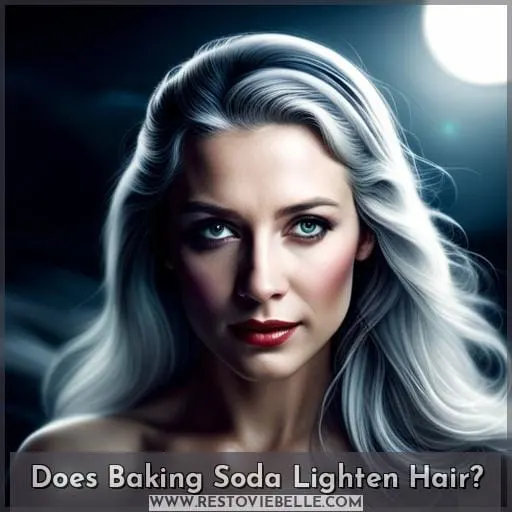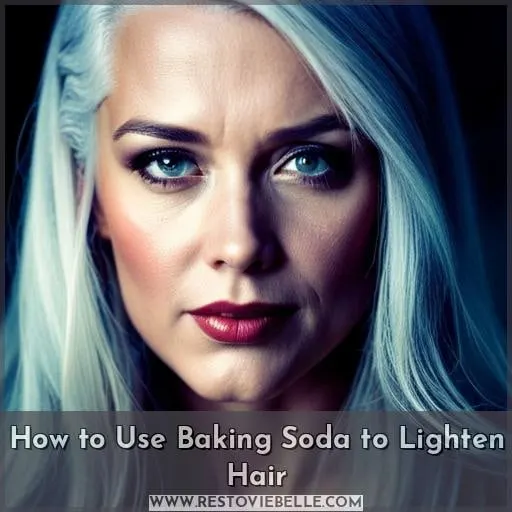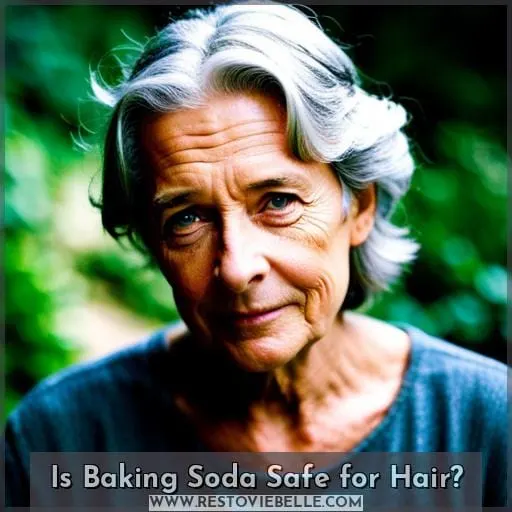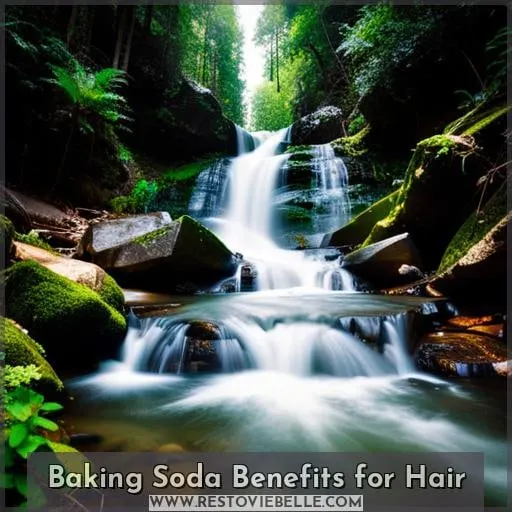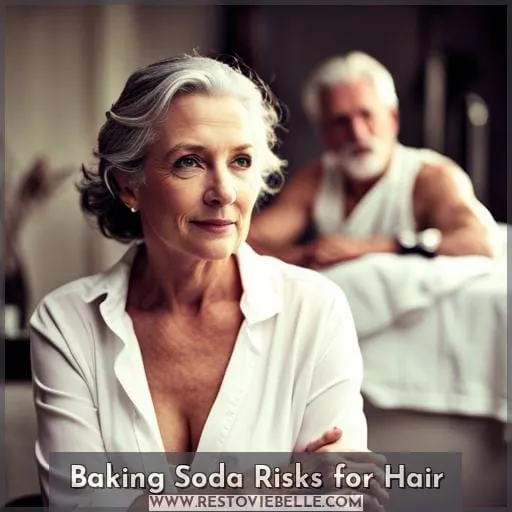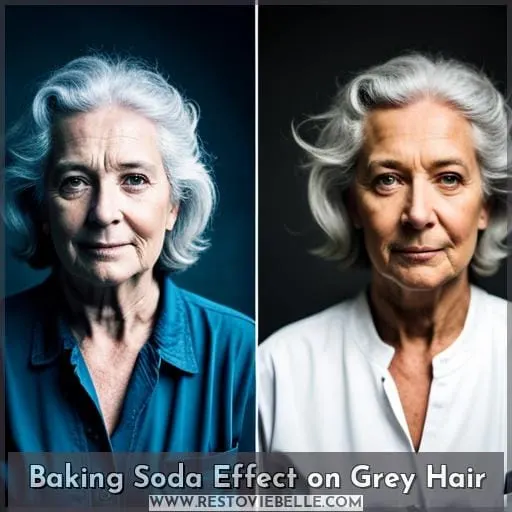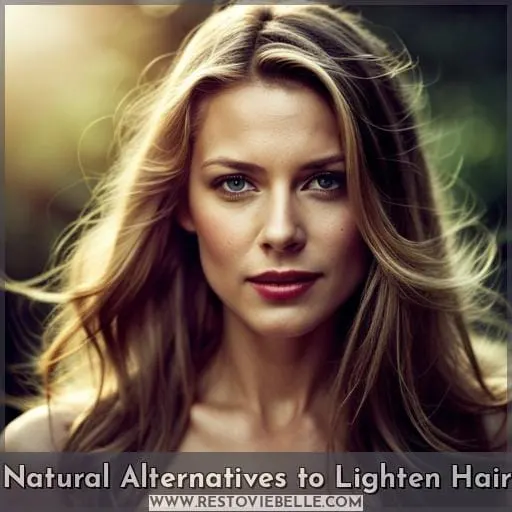This site is supported by our readers. We may earn a commission, at no cost to you, if you purchase through links.
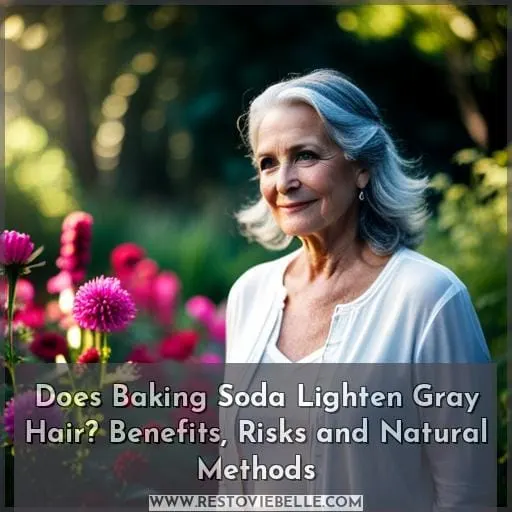 Over the years, you’ve likely used baking soda for all kinds of things around your house. From baking and cleaning to removing stains from clothes, it’s a handy ingredient to have. But did you know that some people also use it in their beauty routine? Specifically, certain folks use baking soda to alter the shade of their gray hair.
Over the years, you’ve likely used baking soda for all kinds of things around your house. From baking and cleaning to removing stains from clothes, it’s a handy ingredient to have. But did you know that some people also use it in their beauty routine? Specifically, certain folks use baking soda to alter the shade of their gray hair.
Even though it may temporarily bleach your locks to look more faded or ashy, you need to exercise caution if you try this, especially with gray hair.
The Internet offers loads of info on baking soda’s supposed hair benefits. Some say it lightens dark hair, lifts dye, moisturizes, and more. However, these claims aren’t necessarily grounded in science or safe practice. Using baking soda on hair, particularly on sensitive scalps or fragile gray strands, carries real risks like irritation and damage.
Still curious? Keep reading to learn how baking soda interacts with gray hair, plus safer natural alternatives for changing your shade.
Table Of Contents
Key Takeaways
- Baking soda can lighten gray hair slightly due to its high pH, but it poses risks like hair and scalp damage.
- There is no scientific evidence to support claims that baking soda restores hair growth or natural pigment.
- Safer, natural alternatives for lightening hair exist, such as lemon juice and chamomile rinses.
- Baking soda is not a long-term solution for gray hair. Embracing your grays or using gentler methods is a better approach.
Does Baking Soda Lighten Hair?
You’d rather avoid using baking soda on your hair to lighten gray strands. Its high pH can damage hair fibers and irritate the scalp. Regardless of myth, baking soda is too abrasive for daily use and won’t eliminate gray hair or restore natural pigment.
While it may strip artificial dye over time, results on non-colored hair are minimal at best.
Consider kinder, natural lightening alternatives instead, like lemon juice or chamomile rinses that brighten subtly sans harsh chemicals. With some trial and error, you can find gentler ways to fade stubborn grays if you wish, without compromising the health of your hair.
How to Use Baking Soda to Lighten Hair
Baking soda can be used to gradually lighten hair color without harsh chemicals. To lighten your hair with baking soda, create a paste by mixing 1 teaspoon of baking soda with water and apply it to damp hair.
The baking soda works as a gentle cleanser to remove residue and product buildup that can darken hair over time. When used occasionally, it can help lift and brighten color, especially for blondes or color-treated hair.
Be careful not to overdo it, as baking soda can dry out hair if used too often. Always follow up with a hydrating conditioner after rinsing.
Baking Soda and Hydrogen Peroxide
Why not mix baking soda and peroxide to see some lighter strands? Combining your baking soda with a small amount of hydrogen peroxide can lighten darker shades without harsh chemicals. However, caution is still needed: don’t overdo the peroxide, do a strand test first, and condition well after to avoid damage.
Baking Soda Alone
While skeptical at first, see for yourself how a simple kitchen staple transforms your locks when used properly.
- Mix 1 teaspoon baking soda with water to form a paste.
- Massage the paste into your hair and leave it in for 15-20 minutes.
- Rinse thoroughly with cool water.
This do-it-yourself method gradually lightens hair without harsh chemicals. It is more gentle than bleach while lifting stains from gray strands.
Baking Soda and Anti-Dandruff Shampoo
Mix up some baking soda and anti-dandruff shampoo for a speedy hair lightener that’ll get the job done in no time. When combined, these ingredients work together to lift color from dyed hair and gently cleanse the scalp.
| Baking Soda | Anti-Dandruff Shampoo |
|---|---|
| 2 tbsp | 2 tbsp |
| Alkalizes hair | Fights dandruff and itch |
| Lightens hair | Cleanses scalp |
| Can be drying | Contains selenium sulfide |
This DIY treatment tackles dandruff while lightening dyed hair in just 5-10 minutes. Rinse thoroughly after use. With regular applications, you will gradually achieve lighter locks.
Is Baking Soda Safe for Hair?
Feel that dry, brittle texture once you rinse – harm’s done. While some tout baking soda for hair health, its alkaline pH of 9 can alter this balance. Your scalp’s natural pH is between 4.5-5.5, so baking soda alters this. Over time, it strips oils, leaving hair frizzy and damaged.
Despite myths, baking soda won’t restore hair growth or color. Focus on gentle scalp care and proven treatments instead. Look to plant oils, aloe, and apple cider vinegar for natural alternatives. Shampoos with tea tree oil or charcoal offer deep cleansing without disturbance.
Prioritize moisture with masks and leave-ins. Harsh DIY solutions often backfire, so treat your hair kindly.
Baking Soda Benefits for Hair
Let’s remove hair dye and lighten dark hair the naturally way today. Stir together some homemade baking soda solutions, applying it to your strands, rinsing thoroughly, then deep conditioning for moisture to reveal brighter, softer hair.
Removing Hair Dye
Squeeze straight hydrogen peroxide onto dyed locks and let sit briefly, then rinse thoroughly to fade color quickly. Expertly create a homemade solution by blending 1-2 tablespoons of baking soda and 1 tablespoon of shampoo.
Massage the paste into your hair for 5-10 minutes before rinsing out to strip dye safely. Alternatively, mix baking soda with anti-dandruff shampoo containing selenium sulfide to expedite fading.
– Lightening Dark Hair
You look stunning with those sun-kissed highlights illuminating your lovely locks. Embrace your inner brightener with baking soda’s gradual gray hair transforming magic. Discover safe, effective DIY methods like mixing baking soda, kaolin clay, and water into a weekly hair mask.
– Moisturizing After Use
After baking soda dries out your tresses, douse them in deep conditioner to bring your locks back from the brink. Opt for weekly deep conditioning to rehydrate parched strands post-baking soda. Massage in nourishing oils too; coconut, olive, and argan oils revive brittle, lackluster hair.
Baking Soda Risks for Hair
When it comes to your hair, you must be cautious with baking soda. It can severely damage your scalp and hair by altering pH levels. This abrasive ingredient causes irritation, itching, and even hair loss over time.
The high pH of baking soda – around 9 – disrupts your hair’s protective cuticle layer, leading to brittle, frizzy strands. It strips your hair of natural oils and moisture, too. Healthy hair needs a pH between 4 and 5.
Consider aloe vera gel or a hair straightening treatment as safer alternatives. Damaging your scalp and strands with baking soda isn’t wise. Seek professional guidance if you’re experiencing thinning hair or want to safely lighten your locks.
Baking Soda Effect on Grey Hair
Don’t believe claims baking soda eliminates gray hair or influences melanin production. Gray hair results from decreased melanin, not from buildup or pH imbalance. Baking soda can’t restore melanin or impact genetics; it only strips hair dye.
Focus on embracing grays, not quick fixes. Gray hair trends favor leaving grays or transitioning gracefully. Tinted shampoos blend grays, while semi-permanent dyes gradually cover them. Seek gray hair care from stylists to find flattering cuts and styles.
Healthy habits like exercise, nutrition, and scalp massage promote circulation. But no shampoo eliminates grays or stops graying.
Gray hair myths falsely promise reversing genetics. Knowledge dispels the myth. Science confirms gray hair’s causes as decreased melanin and inherited genetics – baking soda can’t change that.
Natural Alternatives to Lighten Hair
Opt to juice lemons instead. Your tresses will lighten without salt or peroxide. Here are 3 natural DIY hair lighteners to try:
- Lemon Juice – Rich in bleaching citric acid. Spritz on hair, sit in the sun, then rinse.
- Chamomile Tea – Brew a strong tea, cool it, and use as a hair rinse to gradually lighten over time.
- Honey – Mix with conditioner and leave on hair 30 mins under a shower cap. The peroxide in honey subtly lightens over time.
Rather than baking soda, choose gentler alternatives to naturally lighten hair. Juicing lemons, brewing chamomile tea, or mixing honey into conditioner can gradually and safely lighten hair without chemicals.
Approach with care to avoid dryness or damage. But used sparingly, these methods add highlights and lift color naturally.
Conclusion
The reality is that baking soda won’t miraculously restore your youthful locks or reverse those pesky grays. While it may temporarily lighten and brighten gray hair, its harsh alkaline nature can wreak havoc on your hair health.
You’re better off embracing those distinguished grays or using gentler, natural lighteners. Ultimately, gray hair is nothing to be ashamed of – it’s a mark of the wisdom and experiences you’ve accumulated over a lifetime.

